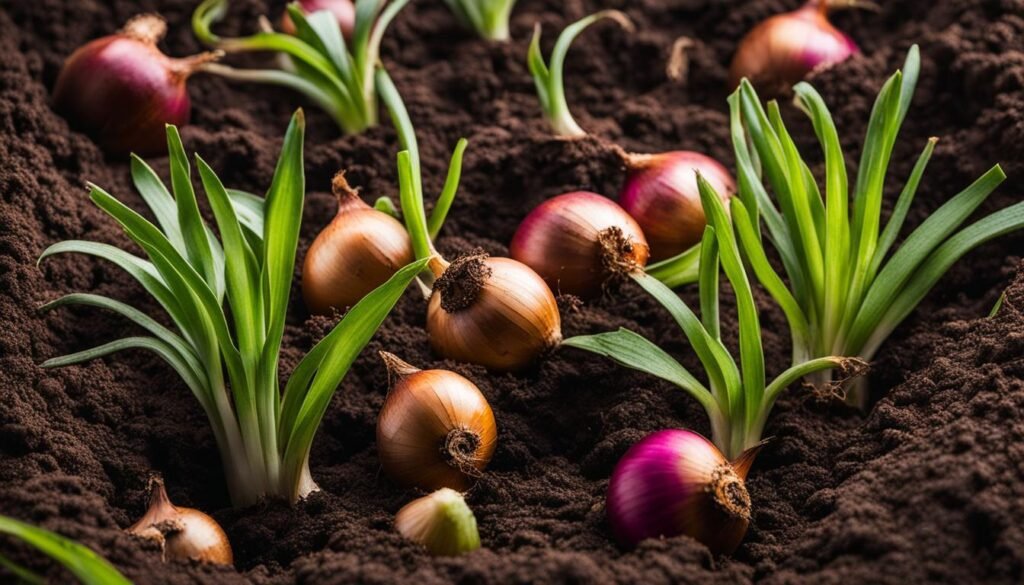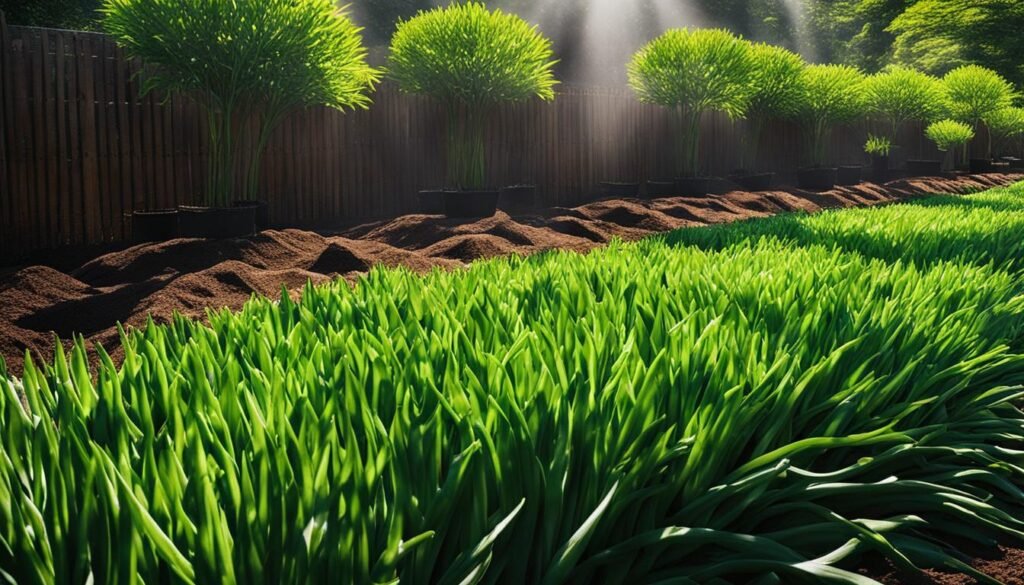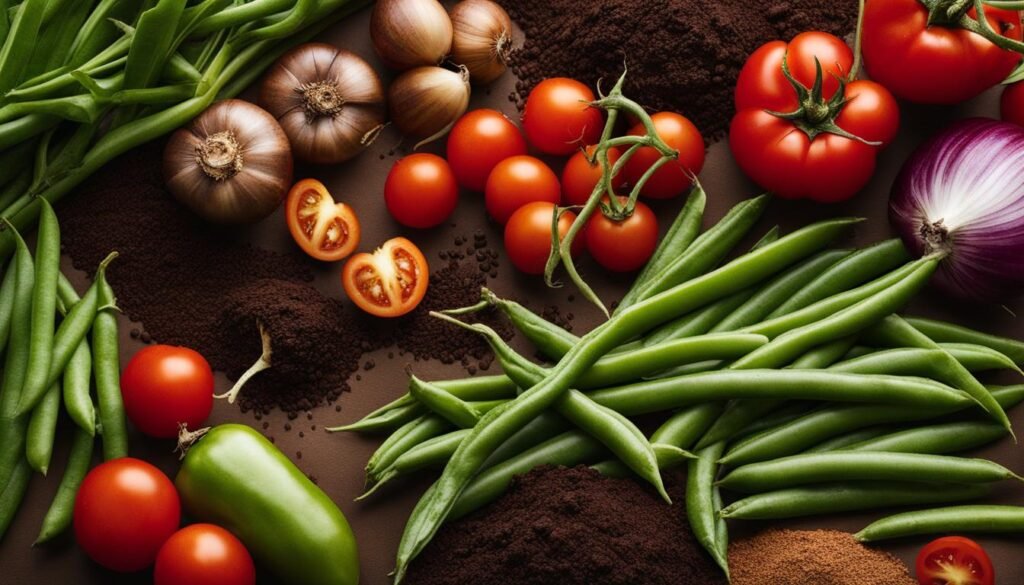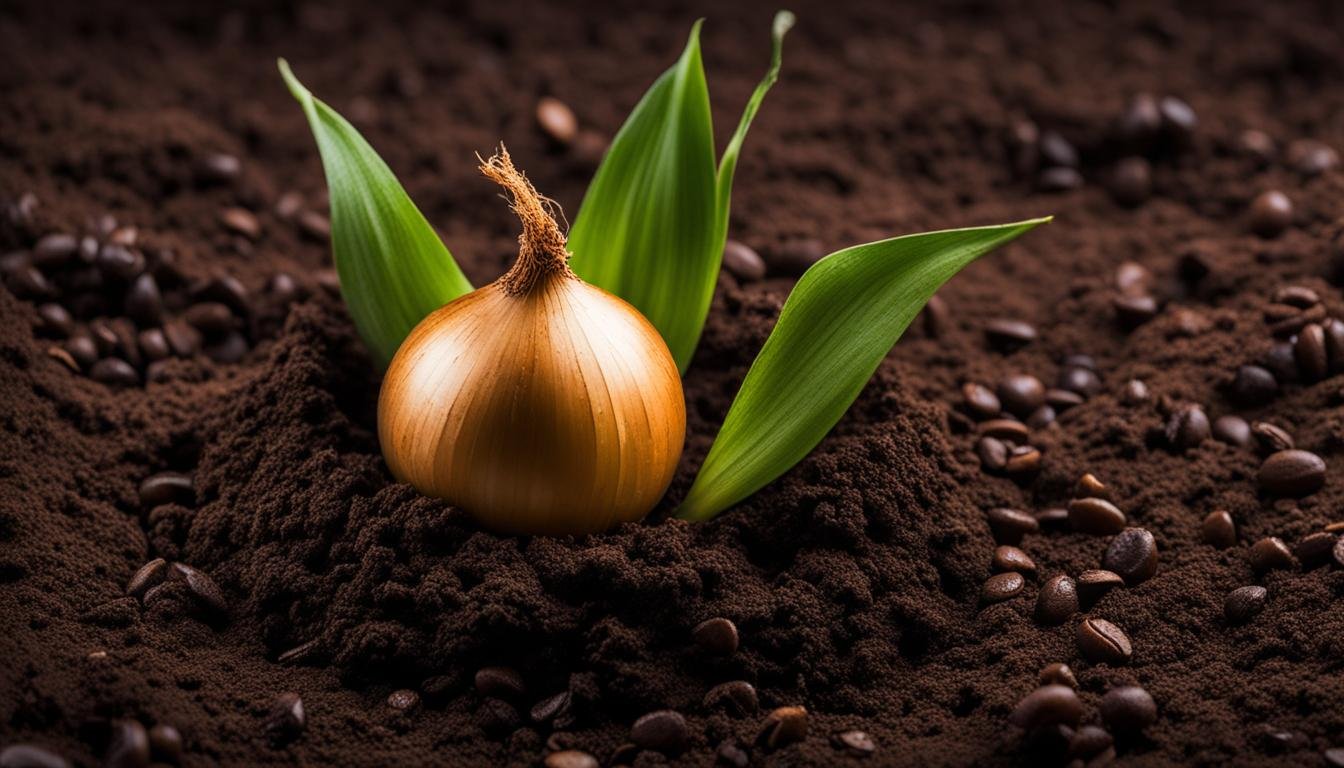When it comes to growing onions, there are various factors to consider to ensure healthy plant development and high yields. One lesser-known secret that can contribute to onion cultivation success is the use of coffee grounds. Yes, you read that right! Coffee grounds, that are often discarded as waste, can actually be a beneficial addition to your onion garden. Let’s explore the benefits and best practices of using coffee grounds for onion plants.
Key Takeaways
- Using coffee grounds as a natural fertilizer for onions provides essential nutrients for healthy onion growth.
- Coffee grounds can act as a natural pesticide, keeping away pests like slugs from your onion plants.
- Using coffee grounds as mulch improves soil drainage and lowers the pH, which is ideal for onion plants.
- Ensure proper balance by mixing coffee grounds with carbon-rich materials like compost.
- Coffee grounds are an affordable and environmentally-friendly option for maximizing onion yield and improving soil conditions.
Using Coffee Grounds as Fertilizer for Onions
Coffee grounds are a nitrogen-rich organic material that can be effectively used as a fertilizer for onion plants. The high nitrogen content in coffee grounds promotes healthy leaf and stem growth, which is essential for onion plants to develop into strong and robust specimens. When using coffee grounds as fertilizer, it is important to balance them with carbon-rich materials such as dried leaves or newspaper. This helps create a well-rounded compost that provides a steady release of nutrients to the onion plants over time.
Composting Coffee Grounds
To make the most of coffee grounds as fertilizer, they can be composted. Composting coffee grounds helps break them down further, making the nutrients more readily available to the onion plants. When composting coffee grounds, it is advisable to mix them with other organic matter such as kitchen scraps or grass clippings. This not only balances the nitrogen content but also adds a variety of other essential nutrients to the compost.
Benefits of Using Coffee Grounds as Fertilizer
Using coffee grounds as fertilizer for onion plants offers several benefits. Firstly, it is a cost-effective way to provide essential nutrients to the plants. Coffee grounds are readily available and can be obtained for free from local coffee shops or cafes. Secondly, using coffee grounds as fertilizer is environmentally friendly. It reduces waste by repurposing coffee grounds that would otherwise end up in landfills. Lastly, coffee grounds improve soil quality by increasing organic matter content and enhancing moisture retention, resulting in healthier and more productive onion plants.
Using Coffee Grounds as a Natural Pesticide

Coffee grounds can be a valuable tool in keeping pests away from your onion garden. One of the main offenders that can damage onion plants is slugs, but they can be deterred with the help of coffee grounds. The caffeine present in coffee grounds is harmful to slugs, causing them to avoid plants that have been treated with coffee grounds. By incorporating coffee grounds into your garden routine, you can protect your onions from these slimy intruders.
When using coffee grounds as a natural pesticide, it’s important to apply them correctly. Carefully spread the coffee grounds around your onion plants, making sure they don’t have direct contact with the foliage. This will help prevent any potential damage to the plant. The strong smell of coffee grounds also acts as a deterrent, keeping pests like slugs at bay.
The Benefits of Using Coffee Grounds as a Natural Pesticide:
- Keeps pests like slugs away from onion plants
- Safe and environmentally-friendly alternative to chemical pesticides
- Does not harm beneficial insects or pollinators
- Improves soil health and fertility
- Easy to incorporate into your gardening routine
By using coffee grounds as a natural pesticide, you can protect your onion plants and promote a healthy garden ecosystem. It’s a cost-effective and sustainable solution that aligns with organic gardening practices. With the right application and maintenance, coffee grounds can be an effective tool in keeping your onion garden pest-free.
Example Cards
Card 1
Using Coffee Grounds as a Natural Pest Control Method
Coffee grounds can be a nontoxic and eco-friendly way to keep pests away from your onion plants. The caffeine in coffee grounds is harmful to pests like slugs, acting as a natural deterrent that keeps them at bay.
Card 2
How to Use Coffee Grounds as a Pest Repellent for Onions
Applying coffee grounds around your onion plants can create a barrier that pests find unappealing. Safely and naturally protect your onion garden from slugs and other unwanted pests with this simple and affordable solution.
Using Coffee Grounds as Mulch

If you’re looking for an affordable and environmentally-friendly way to boost the growth of your onions, look no further than coffee grounds. Not only are they a great source of essential nutrients for your onion plants, but they can also be used as mulch to improve soil conditions and provide additional benefits. Here’s how you can use coffee grounds as mulch in your onion garden:
Mixing Coffee Grounds with Organic Matter
To effectively use coffee grounds as mulch, it’s important to mix them with other organic matter, such as compost or leafmold. This will help prevent clumping and create a well-balanced mixture. By incorporating coffee grounds with other organic materials, you’ll ensure that your onion plants receive a diverse range of nutrients for optimal growth.
Preventing Clumping of Coffee Grounds
When applying coffee grounds as mulch, it’s crucial to avoid clumping. This can be achieved by raking the coffee grounds into the top layer of the soil or mixing them with other organic matter. By evenly distributing the grounds, you’ll allow for proper water penetration and prevent the formation of barriers that could hinder the growth of your onion plants.
Acidifying Soil with Coffee Grounds
One of the added benefits of using coffee grounds as mulch is their ability to acidify the soil. Coffee grounds have an acidic content that can help lower the pH level of the soil, creating an ideal environment for onion plants. However, it’s important to note that excessive use of coffee grounds can lead to overly acidic soil, so it’s crucial to monitor the pH levels regularly and adjust accordingly.
By using coffee grounds as mulch in your onion garden, you can enhance the soil quality, provide essential nutrients, and promote healthy growth. Remember to mix the grounds with organic matter, prevent clumping, and be mindful of the soil’s acidity levels. With these best practices, you’ll be well on your way to a successful onion cultivation experience.
Coffee Grounds for Different Vegetable Crops

When it comes to using coffee grounds as a natural fertilizer, onions are just the beginning. These nutrient-rich grounds can also benefit a variety of other vegetable crops in your garden. Let’s explore how coffee grounds can be used to promote healthy growth in potatoes, carrots, and green crops.
Fertilizing Potatoes with Coffee Grounds
Potatoes, like onions, thrive with the addition of coffee grounds to the soil. Coffee grounds are an excellent source of nitrogen, potassium, and phosphorus, all of which are essential for potato growth. By incorporating coffee grounds into the planting area or adding them to compost, you can provide your potato plants with the nutrients they need for robust tuber development.
Boosting Carrot Growth with Coffee Grounds
Carrots are another vegetable that can benefit from the addition of coffee grounds. The nitrogen content in coffee grounds helps promote lush green foliage, while the potassium content aids in root development. Mix coffee grounds into the soil before planting your carrot seeds or sprinkle them around existing plants to provide a nutrient boost throughout the growing season.
Enhancing Green Crops with Coffee Grounds
Green crops, such as lettuce, spinach, and kale, can also benefit from the use of coffee grounds. Organic matter, like coffee grounds, helps improve soil structure, retain moisture, and provide essential nutrients. Mix coffee grounds into the soil before sowing green crop seeds or apply them as a top dressing around established plants to enhance their growth and overall health.
- Using coffee grounds as a natural fertilizer for potatoes.
- Boosting carrot growth with coffee grounds.
- Enhancing green crops with the help of coffee grounds.
So, whether you’re growing potatoes, carrots, or a variety of green crops, consider incorporating coffee grounds into your gardening routine. They provide a natural and beneficial way to promote the growth and development of these vegetable crops, ensuring a bountiful harvest for you to enjoy.
Conclusion
In conclusion, using coffee grounds for onions provides numerous benefits and is an affordable and environmentally-friendly option for promoting onion growth. Coffee grounds serve as a rich source of essential nutrients for onion plants, including nitrogen, potassium, phosphorus, and micronutrients. These nutrients are crucial for the healthy development of onions and can contribute to increased yields.
Additionally, incorporating coffee grounds into the soil improves its organic material content, which enhances soil structure and fertility. The coffee grounds act as a natural fertilizer, supplying the necessary nutrients for onion plants while also enriching the overall soil conditions. This can lead to stronger and more vibrant onion plants.
Moreover, coffee grounds offer additional advantages when used in onion gardens. They can act as a natural pesticide, deterring pests such as slugs, thanks to the caffeine content present in the coffee grounds. By spreading coffee grounds around the onion plants, gardeners can keep these unwanted pests at bay.
In summary, incorporating coffee grounds into onion gardens provides multiple benefits, including the supply of essential nutrients, improvement of soil conditions, and natural pest control. By utilizing this readily available resource, we can create healthier and more productive onion plants while promoting sustainable and eco-friendly gardening practices.
FAQ
Do coffee grounds benefit onion plants?
Yes, coffee grounds contain essential nutrients that are beneficial for onion plants, such as nitrogen, potassium, phosphorus, and micronutrients.
How can I use coffee grounds as fertilizer for onion plants?
Coffee grounds can be sprinkled thinly into the soil or added to compost. It is important to balance them with carbon-rich materials like dried leaves or newspaper for optimal composting.
Can coffee grounds act as a natural pesticide for onion plants?
Yes, coffee grounds can help keep away pests like slugs. The caffeine in the coffee grounds is harmful to slugs, making them avoid plants treated with coffee grounds.
How can I use coffee grounds as a natural pesticide for onions?
Coffee grounds can be spread around the onion plants carefully, ensuring they do not have direct contact with the plants. The strong smell of the coffee grounds also acts as a deterrent for pests in the garden.
Can I use coffee grounds as mulch for onion gardens?
Yes, coffee grounds can be mixed with other organic matter like compost or leafmold and used as mulch. They can also be raked into the top layer of soil to prevent clumping.
Are coffee grounds suitable for other vegetable crops?
Yes, coffee grounds can be used as a fertilizer for various vegetable crops, including potatoes, carrots, and green crops. They are particularly beneficial for roses, hibiscuses, and begonias.
What are the benefits of using coffee grounds for onions?
Using coffee grounds for onion plants provides essential nutrients, improves soil conditions, and increases organic material. It is an affordable and environmentally-friendly option for onion growth, maximizing yield and promoting healthy development.
Are coffee grounds safe and beneficial for onion plants?
Yes, using coffee grounds as fertilizer for onion plants is safe and provides them with essential nutrients for healthy growth.

Leave a Reply